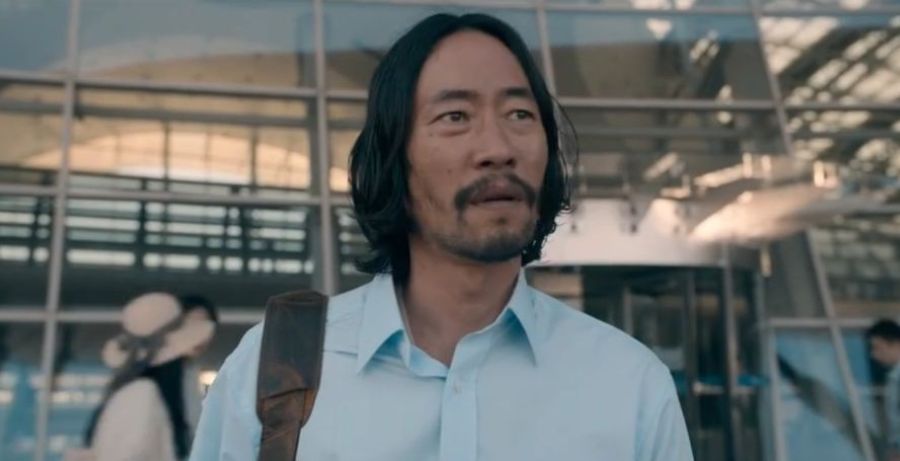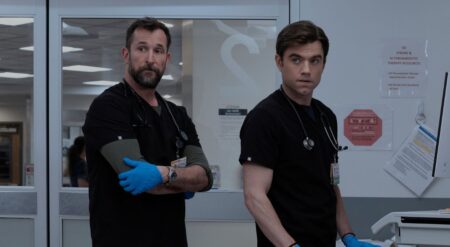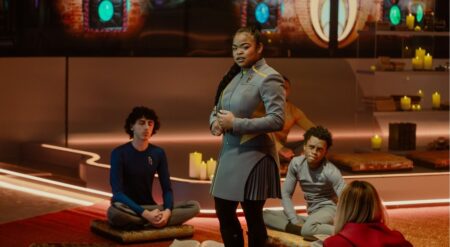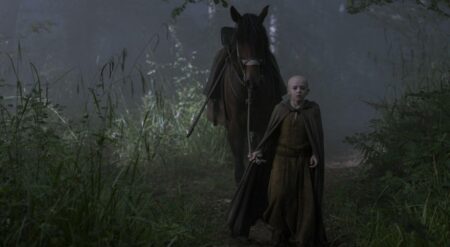When done well, stories about superpowered people who aren’t superheroes can go far. Powers can push characters out of range for empathy from the audience, but when handled correctly, they never become untethered from the larger narrative themes, remaining grounded even as they soar. Moving understands this. Superpowered people and the sublime action they’re a part of mean nothing if the characters themselves aren’t layered dynamically with connections and ideals that center them. A Hulu exclusive Kdrama series (Disney+ in Asia), Moving is a blend of family drama, generation storytelling, action spectacle, and thoughtful exploration of expectations.
Directed by Park In-je and Park Youn-seo, the series is adapted from the webcomic of the same name by Kangfull, adding another hit to the list of webcomic adaptations. Starring Ryu Seung-ryong, Han Hyo-joo, Zo In-sung, Lee Jung-ha, Go Yoon-jung, and Kim Do-hoon, Moving deals with an overreaching government, teens coming into their superpowers and how powers have affected different generations. In the 1990s, South Korea’s National Security Planning Agency established a black ops team of superpowered individuals, capturing them as they saw fit. Once caught, those with powers are tasked with carrying out classified missions as members of an elite unit formed to protect the country. Then, one day, they went dark.
But Moving isn’t a Kdrama set in the 1990s. No, it’s about who comes after and grappling with the impact that the National Security Planning Agency had on future generations. A few decades after the unit went dark, Kim Bong-seok (Lee Jeong-Ha), a boy who could float before he could walk, Jang Hee-soo (Go Yoon-Jung), a girl who survived a horrific car crash unscathed, and Lee Gang-hoon (Kim Do-Hoon), a boy with enhanced strength and speed, all end up at the same school. Used to being the odd ones out, Hee-soo and Bong-seok become quick friends after confiding in each other and discovering that they’re not so alone in their uniqueness.

While their powers connect them, they also make them targets. Bong-seok and Hee-soo are an adorable pair whose friendship and connection hold up the series. But this carefree element is smartly balanced against Frank, a delivery driver who has been stalking across Seoul, murdering anyone with powers that he can find.
There is a tenderness to the series that comes from Hee-soo and Bong-seok’s relationship. Their innocence and care for each other come through as one of the most wonderful choices. But their youth isn’t the sole focus of the series, and that allows it to stay special throughout the narrative, developing a greater weight as the danger closes in and as we meet more characters. The older characters of the series also have charisma and endearing parental love that is unequivocally strong.
While some Kdramas with young leads in dire circumstances forget that they are in fact children, Moving never does. Instead, the inclusion of their parents as protectors creates a dynamic lens through which the story to be told. Powers don’t make you an adult or prepared for the world, but they can make it all scarier. The fact that the young cast, even with their traumas, is able to be just that is a thoughtful choice that pays off for the series.
Moving is a Kdrama that will undoubtedly be compared to Heroes, but what separates this series from the well-walked path of superpowered people running from a big bad is how tight every character is in regards to where they fit in the story, how they impact the people around them, and how they grow. With Kangfull, the webcomic’s creator, also writing the series’ screenplay, you can tell just how dynamic each character is and how well charted their narrative paths are.

Outside of the characters, though, Moving has to be commended for its stellar action sequences. With set pieces that pack a wallop with explosions, breaking walls and glass, and hand-to-hand fight sequences that are shot perfectly, the diversity of action on display is phenomenal. Ryu Seung-beom as Frank is at the center of the action and his presence on-screen is commanding, with just the right amount of somber loneliness that shines through when we first see him at the airport until the series ends.
Moving is another example of the range that Kdrama have when it comes to genre. While dramas are just a name for a television series, the breadth they have for what can be explored in genre storytelling is unmatched, especially when they have an episode order that gives them the time they need to sell sci-fi concepts, deliver high stakes, and brutal action, and still hold it all together with a strong narrative without ever feeling rushed.
Moving isn’t just a series that can be classified as an action-heavyweight. It’s also a narrative giant as well. With an ensemble cast that stretches the viewers’ focus beyond expectation, Moving is able to highlight every single character it adds, thanks to the more traditional Kdrama length of 20 episodes. A long series in a time where Netflix has been truncating every series it can even for Korean studios, Moving doesn’t waste any minute of its runtime across them all. It needs every single one of the 20 episodes to stick the landing, and it never overstays its welcome. In fact, this is a world I want more of, with characters I am yearning to come back to.
Moving is streaming now, exclusively on Hulu.
Moving
-
Rating - 9.5/109.5/10
TL;DR
Moving isn’t just a series that can be classified as an action-heavyweight. It’s also a narrative giant as well. With an ensemble cast that stretches the viewers’ focus beyond expectation, Moving is able to highlight every single character it adds, thanks to the more traditional Kdrama length of 20 episodes.







